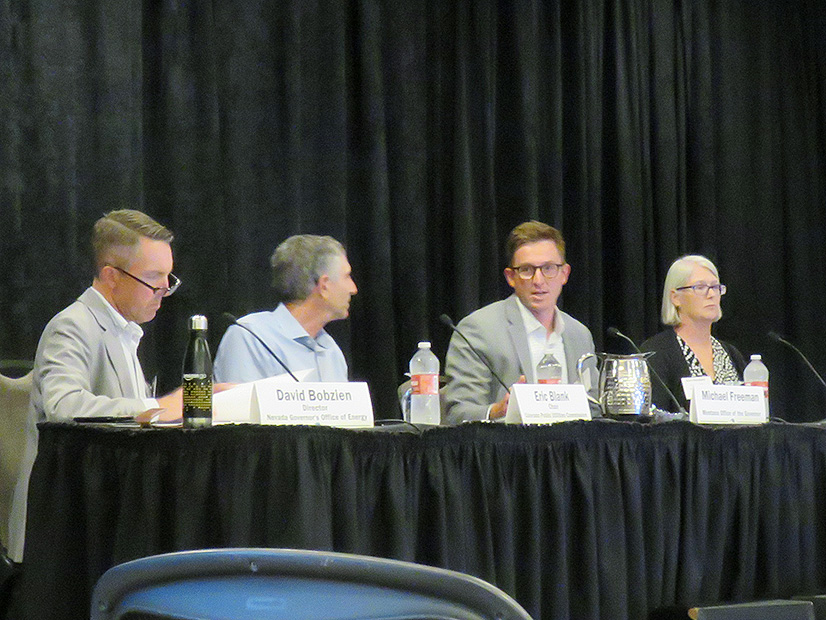
A panel at the fall CREPC-WIRAB meeting that discussed CREPC's potentially expanded role included (from left) David Bobzien, Nevada Governor's Office; Colorado PUC Chairman Eric Blank; Michael Freeman, Montana Governor's Office; and Washington UTC Commissioner Ann Rendahl.
| © RTO Insider LLCTEMPE, Ariz. — The Committee on Regional Electric Power Cooperation (CREPC) is attempting to play a role in Western market formation like the one performed by the Organization of PJM States Inc. (OPSI) in the East, becoming a clearinghouse of information on organized markets and an adviser and advocate for states, especially those with understaffed utility commissions.
“One of the most pressing issues in the West today is the proliferation of forums in which market participants are developing and evaluating incremental steps towards regional electricity coordination — whether through energy markets, resource adequacy sharing, transmission planning or the leap to a full regional transmission organization,” regulators and representatives from 14 Western states wrote in a letter sent to the U.S. Department of Energy in July, urging funding for the CREPC effort.
Current regional market efforts in the balkanized West include CAISO’s proposed extended day-ahead market (EDAM) for its Western Energy Imbalance Market; SPP’s planned Markets+ program, which also includes a day-ahead market; the Western Power Pool’s Western Resource Adequacy Program (WRAP), a West-side RA initiative; and the Western Market Exploratory Group, a loose coalition of utilities assessing market options.
“Each of these efforts has multiple working groups with its own set of meetings,” the letter said. “State utility regulatory commissions and energy offices often do not have the staffing levels, expertise or organizational ability to meaningfully participate in each of these market conversations — or sometimes even understand what is happening and how state interests may be implicated.
“Individual states have been working — somewhat unevenly across the region — to commit more time to regional matters, but acting now to support a collective effort to improve awareness and coordination among states will improve the outcomes of these dialogues,” it said.
The Western Interstate Energy Board (WIEB), of which CREPC is a member committee, applied for $4.1 million in DOE funding to support the initiative to allow the committee play a greater role in educating and convening Western stakeholders as they weigh market participation.
“With support, WIEB could deliver a consolidated and consistently staffed forum for states to become educated on regional cooperation development considerations, to discuss issues among one another, and to inform or respond to emerging regional designs on an opt-in basis,” the letter said.
A panel at last week’s joint meeting of CREPC and the Western Interconnection Regional Advisory Board (WIRAB) weighed the potential for creating a regional committee for the West, similar to OPSI.
“With funding support from the U.S. Department of Energy, CREPC could deliver a consolidated and consistently staffed forum for states to become educated on regional electricity coordination, to discuss issues among one another, and to inform or respond to emerging regional designs,” the agenda item for the panel said.
CREPC, established in 1982, is a joint committee of WIEB and the Western Conference of Public Service Commissioners, informally composed of state energy office officials and utility commissioners, that works to improve the efficiency of the Western grid.
David Bobzien, director of the Nevada Governor’s Office of Energy, said on the CREPC-WIRAB panel that “I consider this to be the highlight of our proceedings. … It’s been a long time coming for this discussion. There have been various conversations swirling about the West in recent months about how best to position, shape, guide [and] facilitate the conversation around markets in the West. And this is a proposal for how to answer that question.”
Another panelist, Washington Utilities and Transportation Commissioner Ann Rendahl, called the DOE funding request crucial.
“Like many agencies and state commissions and even corporations, the Washington commission has lost some staff this year,” Rendahl said. “We’re trying to replace staff at a time when it’s very difficult to get new staff. We are resource-constrained, and having the ability for this provides CREPC as an organization to more fully support states and answer some of these questions about these key market developments and aspects of markets.”
She cited the comments of FERC Commissioner Mark Christie, who spoke in a prior session and emphasized the importance of a committee like OPSI as states wade into organized markets. Christie, a longtime utility regulator in Virginia, was a founding member of OPSI in the early 2000s as PJM grew into the nation’s first RTO. The current discussion in the West about establishing a similar organization to inform and advocate for states’ interests is a “critically important topic,” Christie said.


